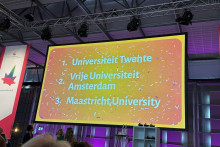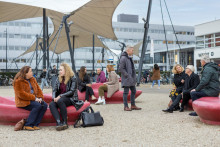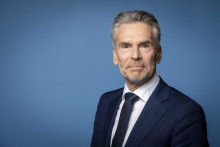On August 31 in the National Muziekkwartier the red carpet was rolled out to open the academic year. The outlook for higher education came to life in the opening speeches and prizes were awarded.
The Education Minister Ronald Plasterk remarked over several factors straining the higher education system. The current system was developed in the 1950s when only 5 percent of the youth population flowed in to the higher education system. In the meantime, the percentage has increased to 47 percent, just shy of the Dutch government’s desired target of 50 percent. According to Plasterk, students earning a HAVO, VWO or MBO diploma are flocking to higher education at the same time that more students, whose native language is not Dutch, also want to gain entrance.
Less optimistically, the minister said 36 percent of HBO students do not finish their studies, and some students are prematurely forced to choose their education path before exploring all possibilities.
Plasterk begged the question, ‘Is the current higher education system working, or would a broader system be an improvement?’ Plasterk said he is impressed by the university college concept, which offers broad courses on a small scale and also seams the gap between vocational and university education.
Considering modeling other international university systems, the minister said he is impressed by the dynamics and flexibility of an American system based on four tiers: community colleges, four-year colleges, universities and graduate schools. As an example of success, he mentioned President Barack Obama, who started at a community college, later moving on to Columbia University where he earned his law degree, and eventually he graduated magna cum laude from Harvard Law School.
Following his speech, Dr. Anne Flierman, the chairman of the Executive Board (CvB), spoke of meetings to be held the following day concerning decisions about tenure positions for women, chiming in with the minister’s last comments about ‘emancipating women in higher education.’
The Rector Magnificus Henk Brinksma addressed the current social problems, outside of the financial crisis, affecting the role of educators in higher education. He highlighted broad topics such as climate, energy, water and the ‘graying of the population,’ saying, ‘It’s a big mistake to think it’s business as usual.’ Two ways to address these issues, said Brinksma, is to offer high quality education which delivers well-educated people. Though the rector would have liked to hear more from the minister about financing higher education, he went on to speak about the important role of the university to find solutions to solve social problems through research. He stated, ‘Wide vision must be consequentially put into practice.’
Later in the evening, the professor of the history of industrial design, Jan Willem Drukker, was awarded the Central Education Prize, a cash prize of 2,500 euros, by the president of the Central Education Committee, Robert Landheer.
Before the academic school year was officially declared open, Brinksma launched the FAME arrangement for student entrepreneurs. ‘Entrepreneurship is in the genes of the UT,’ he said.
He stated that more than 700 companies have sprung from the university over the years. FAME, collaboration between the Student Union and Kennispark Twente, provides support for business-oriented students and students who want to continue their business once they have completed their studies. The arrangement offers a study and business coach, legal help and credit from the Rabobank Haaksbergen. FAME was unveiled by Menno van der Werff, who started the first web and media design company, utilizing the arrangement.
The minister has formed a committee to weigh-out the advantages and disadvantages of possibly reforming the Dutch system to accommodate the more diverse and increased student population flowing in to higher education. His sights are set on examining higher education systems in other countries. By next spring, the findings of the committee will be presented, offering a clearer picture of the path of higher education in the Netherlands, said Plasterk.
 |
| Minister Plasterk’s central message at the opening of the academic year: the Dutch higher education system is in dire need of reform. Photo: Gijs van Ouwerkerk |







